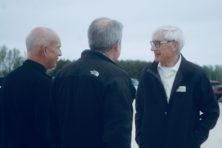Governor Doyle Requests Helping Hands
- Share
- Tweet
- Pin
- Share
Governor Jim Doyle asked Door County business owners and residents for a helping hand Friday morning for people in areas of Wisconsin still struggling to get back to normal life in the aftermath of an extremely wet June.
“This could be the biggest natural disaster Wisconsin has ever had,” Doyle sadly relayed to a small crowd at the Landmark Resort. County tourism leaders were invited to a breakfast with the governor.
“Total losses are approaching $500 million,” said Doyle, “and there have already been 30,000 applications sent in to FEMA (Federal Emergency Management Agency) for help.”
High water levels in Spring Green still have not receded, Doyle said, and many people continue to be displaced from their homes, many without insurance.
Repercussions of the disaster have reached Door County, according to Kelli Trumble, state secretary of tourism, because of the way the disaster has been portrayed in the media.
“Six days ago, my department rolled out an original ad campaign called ‘Places, People and Possibilities,’” Trumble said. “We’ve never done anything like this in mid-summer. We’re doing it to show the can-do spirit of Wisconsin residents and businesses.
“We’re telling people that the best thing they can do for Wisconsin right now, is to keep their travel plans,” Trumble said.
In efforts to boost tourism in Wisconsin this summer, the Department of Tourism has invested in digital bill boards in Chicago, taken out ads, submitted letters from the governor to the Chicago Tribune and guest columns.
Despite high gas prices, Trumble said, her department is reporting solid tourism statistics from the July 4th weekend.
On a lighter note, the governor praised the signing of the Great Lakes Compact in May as a document that could become the Kyoto Protocol of the Upper Midwest – if the states and provinces involved take the language and put it into action.
“It’s going to be about re-doing the outdated sewer systems around the Great Lakes, about replenishing the fisheries,” Doyle said. “The success of the Compact won’t depend on the legislation itself, the issue is how do we work through the language to live up to the Compact.”
Doyle stressed the need for the eight states and two Canadian provinces surrounding the Great Lakes to consistently adopt and implement regulations. If one state adopts and imposes tighter regulations than surrounding states, the economic implications could be detrimental to the success of the Compact, Doyle said.
Although he is not up for re-election, Doyle briefly talked policy on an issue that hits home with Door County residents and business owners: affordable health care and insurance.
“Wisconsin will soon become the number one state in the country with the number of people we have covered,” Doyle said.
Even though Wisconsin may be leading with the number of health insured lower-income residents, employees of small businesses – 50 people or less – are still struggling to pay for coverage.
“Health insurance companies should have to rate all 800,000 people in Wisconsin the same as far as health insurance goes,” Doyle said. “If we can get 30 to 40 percent savings out of the system, the majority of businesses could afford to provide health insurance for their employees.”


